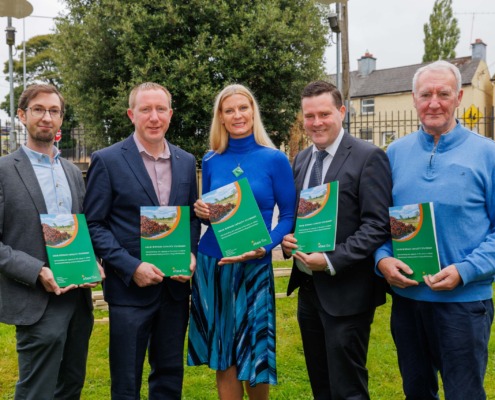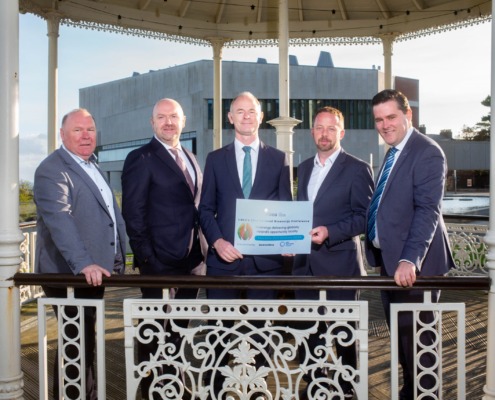Press Release: IrBEA’s report demonstrates the potential of the sector to deliver decarbonised heating solutions using Solid Biomass

For Immediate Release:
23/12/2024
The Irish Bioenergy Association (IrBEA) has launched its Solid Biomass Capacity Statement (SBCS) report. The objective of this report is to demonstrate the potential of the sector to deliver decarbonised heating solutions using solid (woody) biomass to a wide variety of heat users across the residential, commercial and industrial sectors.
Speaking at the launch, Seán Finan, IrBEA CEO said: “Ireland has a huge opportunity to embrace the potential to expand and use solid biomass as a clean, renewable heat solution across all use levels. According to Eurostat figures, Ireland has the lowest level of deployment of renewable heat in the European Union (EU) at 5.2%. This is well below target and sets out the scale of the challenge facing Ireland in order to decarbonise the heating sector and comply with renewable energy and greenhouse gas emission reduction targets”
Finan continued: “This document provides the evidence to commercial and industrial heat users regarding the capacity of the sector to deliver cost-effective decarbonised heating solutions using solid biomass. The current and future availability of solid biomass in Ireland and the supply network that exists to mobilise the resource across Ireland is showcased. Ireland has significant capacity in solid biomass systems design, installation and maintenance, technology availability and industry expertise, knowledge and skills. Sustainability and air quality in the use of solid biomass are addressed as well as the financial models and supports which exist and the potential contractual arrangements available for the sale and supply of renewable heat using solid biomass.”
Solid biomass used for renewable heat is derived from sustainably managed forests, with woodchip and pellet generally used in industrial and commercial heating sectors. The main objective of commercial forestry in Ireland and across Europe is to produce high quality timber for use in the construction sector as low embodied carbon building materials. Production of sawlog sized material involves practices such as thinning and the production of smaller size logs that have a number of markets, including for energy use, once existing board mills and other solid wood uses have been satisfied.
Speaking at the launch, Dr Eugene Hendrick, Chairman of the IrBEA Solid Biomass Group said: “In Ireland, the Council for Forest Research and Development (COFORD) has collated a series of All Ireland roundwood production forecasts over the past decade, and these set out the detailed methodology for calculating the supply of forest-based biomass. The Capacity Statement draws on the data from the forecast, with annual summaries of amounts. The solid biomass resource has the potential to increase from a current level of supply of approximately 9.5 PJ/year to 15-16 PJ/year or approximately 2.4 – 2.5 million green tonnes of biomass per year by the middle of the next decade.”
Hendrick continued “In addition to the solid biomass resource potential outlined, there is potential to sustainably increase Irish biomass production further through the establishment of Short Rotation Coppice (SRC) such as willow and Short Rotation Forestry (SRF) such as poplar and eucalyptus. This can be further supplemented with residual biomass recovery from agricultural management practices. It is estimated that all the additional sources could add to future biomass production by 300,000 to 400,000 tonnes per annum.”
Finan concluded: “The solid biomass capacity statement provides information and market certainty relating to energy users considering deploying biomass fuelled heating systems. The document will provide confidence and certainty to heat users and all stakeholders that the sector has the capacity to deliver and contribute significantly to the decarbonisation of heat and to the achievement of sustainable development now and into the future.”
ENDS.
For Further Information Contact: Seán Finan IrBEA CEO on 087 4146480
Notes to Editors:
Photograph Caption:
Pictured at the recent Wood Fuel Quality Assurance (WFQA) Scheme AGM held at the Tullamore Court Hotel, Co. Offaly, the Irish Bioenergy Association (IrBEA) presented the Solid Biomass Capacity Statement to Senator Pippa Hackett, Minister of State at the Department of Agriculture, Food and the Marine. Picture L to R are Stephen Mc Cormack Project Executive IrBEA, Noel Gavigan Technical Executive IrBEA, Senator Pippa Hackett Minister of State, Seán Finan IrBEA CEO and Dr Eugene Hendrick Chairman of IrBEA Solid Biomass Group.









